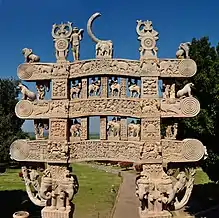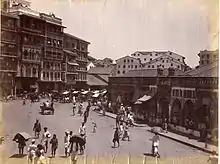Timeline of Mumbai
The History of Mumbai, can be traced back to 600 BC, when evidences of the first known settlement,Harrappan Civilization, here have been discovered.
Part of a series on the |
|---|
| History of India |
 Satavahana gateway at Sanchi, 1st century CE |
up to 18th century
- 600 BC – First known permanent settlement were the Marathi speaking Koli & Agri community.[1]
- 300 BC – Part of Ashoka's Empire.
- 900 to 1300 – part of Hindu Silhara dynasty.
- 1343 – Part of the Gujarat Sultanate
- 1431 – Haji Ali Dargah built.
- 1508 – Francisco de Almeida sailed into the deep natural harbour.
- 1534 – Mumbai ceded to the Portuguese.
- 1661 – Portuguese Princess Catherine of Braganza brings Bom Bahia to King Charles II of England as part of her marriage dowry.
- 1668/1669 – British East India Company leased the seven islands of Mumbai from Charles II
- 1670 – First printing press imported to Mumbai by Parsi businessman Bhimjee Parikh
- 1672 – Consecration of the first Tower of Silence and first Fire temple (Hirji Vachha Agiary, now defunct)
- 1675 – Population estimated to have risen to 60,000 from 100,000 in 1661.
- 1675 – The Mumba Devi temple built near the main landing site on the former Bori Bunder creek or inlet, against the north wall of the English Fort Saint George.
- 1709 – First attested private Parsi Adaran (in the home of Banaji Limji). Continues to be the oldest continuously-burning Zoroastrian fire in Mumbai (now in the Banaji Limji Agiary, Fort).
- 1735 – Start of shipbuilding industry (Wadia docks, Duncan docks)
- 1750 – Asia's first dry dock built by Lovji Wadia in Mumbai
- 1777 – First newspaper published in Mumbai by Rustom Kersaspjere
19th century
.jpg.webp)
Mumbai in 1888

Mumbai ca. 1890
- 1801 – Siddhivinayak temple built at Prabhadevi.
- 1803 – Fire.[2]
- 19 June 1810 – HMS Minden floated, first Royal Navy ship built outside the British Isles and from the deck of which the Star Spangled Banner would be composed
- 1822 – First vernacular language newspaper in Mumbai, Mumbai Samachar published by Fardunjee Marzban. India's oldest newspaper still being published.
- 1838 – First edition of Mumbai Times and Journal of Commerce launched
- 1845 – Grant Medical College founded.
- 1846 – Mahim Causeway between Salsette and Mahim completed.
- 16 April 1853 – First railway line in India between Mumbai and Thane.
- 1854 – First cotton mill started.
- 1857 – University of Mumbai established.
- 1858 – The Chartered Bank of India, Australia and China opens its Mumbai branch.
- 1864 – The Bombay, Baroda, and Central India Railway (later merged with other railways to form Western Railway) is extended to Mumbai.
- 1870 – Mumbai Port Trust formed.
- 1874 – St. Peters School was set up by S.S.J.E. at Dockyard
- 1885 – Indian National Congress formed at Gowalia Tank Maidan.
- 1887 – Veermata Jijabai Technological Institute (VJTI) established. First and only institute offering degree in engineering until 1960.
- 1888 – Brihanmumbai Municipal Corporation founded.
- 1890 – Robert Harris, 4th Baron Harris arrives to take over as Governor of the Presidency of Bombay.
- 1893 – Sectarian rioting between Hindus and Muslims.
- 1896 – Famine followed by break out of bubonic plague. Waldemar Haffkine begins plague research at Grant Medical College.
- 1897 – Haffkine announces plague vaccine, tests it on himself and on volunteers from Byculla Jail.
- 1897 – First ever gasoline motor-car in the Indian subcontinent brought to Bombay by Mr Forster of Crompton Greaves.
- 1899 – Bombay plague epidemic
20th century
- 1900 – By this year, 45 trains of Western Railway in each direction were carrying over one million passengers annually.
- 1908 – Franciscan Missionary Brothers, a German Missionary established St Francis D'Assisi High School in Borivali, west suburbs of Mumbai, India.
- 1911 – King George V and Queen Mary visit Mumbai. Gateway of India is built to commemorate their arrival.
- 1912 – King George English School,Dadar,Mumbai was established, Now known as Raja Shivaji Vidyasankul, Dadar, Mumbai[3]
- 1913 – Sydenham College established. The First College of Commerce in Asia.
- 12 January 1915 – Gandhi returns to India from South Africa at Mumbai.
- 1920 – Half of Mumbai [ Arthur road (Chinchpokli West)to Kalachauki (cotton green station), sewri station- Bharatmata (Lalbaug) ] united in Chinchpokli to celebrate Ganesh Festival. People came from all over Mumbai to Chinchpokli in Ganesh Festival.
- 22 January 1926 – King Edward Memorial Hospital inaugurated.
- 15 July 1926 – First motorised bus ran between Afghan Church and Crawford Market.
- 1928 – The first electric train runs between Churchgate and Borivali.
- 1930 – Mumbai Cricket Association established.
- 15 October 1932 – J. R. D. Tata flew from Karachi to Mumbai via Ahmedabad landing on a grass strip at Juhu paving the way for civil aviation in India.
- 1 October 1933 – UDCT established. First institute dedicated to research in Chemical Engineering in India.[4]
- 1934 – Congress Socialist Party founded.[5]
- 1940 – reclamation of land that will become Nariman Point begins.
- 8 August 1942 – Quit India Movement declaration passed at Gowalia Tank Maidan.
- 14 April 1944 – Mumbai Harbour Explosion kills scores of people and hurls debris up to 3 km away.
- 1947 – Progressive Artists' Group founded.[6]
- 1958 – IIT Bombay established in Powai.
- 1960 – "Flora Fountain incident": 105 Samyukta Maharashtra Samiti demonstrators killed in altercation with the police
- 1 May 1960 – Mumbai becomes the capital of newly formed Marathi-state Maharashtra.
- 31 March 1964 – Last tram made its journey from Bori Bundar to Dadar.
- 1982 January – Great Bombay Textile Strike started, by mill workers of Mumbai, under trade union leader Dutta Samant.
- December 1992 – January 1993 – Over 2000 people killed in Hindu-Muslim communal riots following the Babri Masjid destruction.
- 1993 – Serial bomb blasts across Mumbai, masterminded by underworld don Dawood Ibrahim, kill 300 and injure hundreds more.
- 1995 – Bombay renamed Mumbai. Subsequently, University of Bombay renamed to University of Mumbai.
21st century

Bandra-Worli Sea Link
- 2003–04
- 27 January – Bomb goes off in a bus in Ghatkopar killing 2
- 27 January – Bomb goes off on a bicycle in Vile Parle killing 1
- 13 March – Bomb goes off in a train in Mulund killing 10
- 28 July – Bomb goes off in a bus in Ghatkopar killing 4
- 25 August – Two Bombs go off in cars near the Gateway of India and Zaveri Bazaar killing 50
- 2005 – Torrential July rains and flooding – the worst in 120 years – push the death toll to nearly 450. See 2005 Maharashtra floods.
- 2006
- 11 July – Series of seven bombs go off in trains killing 207
- Google office in business.[7]
- 2008 – November 2008 Mumbai Attacks more than 10 coordinated shooting and bombing attacks across Mumbai, killing 164
- 2009 – Bandra-Worli Sea Link inaugurated.
- 2011 – Series of bombs go off killing 26
- 2014
- 2014 – Snehal Ambekar becomes mayor.
- 1 February – Mumbai Monorail inaugurated
- 8 July 2014 – Mumbai Metro inaugurated
See also
- List of riots in Mumbai
- List of mayors of Mumbai
- Years in India
References
- http://nirc.nanzan-u.ac.jp/nfile/1064
- Schellinger and Salkin, ed. (1996). "mumbai". International Dictionary of Historic Places: Asia and Oceania. UK: Routledge. ISBN 9781884964046.
- "I.E.S. Raja Shivaji Vidyalaya". www.iesrsv.com. Retrieved 12 December 2016.
- Ṭikekara, Aruṇa (2006). The Cloister's Pale: A Biography of the University of Mumbai. Popular Prakashan. p. 198. ISBN 978-81-7991-293-5. Retrieved 12 June 2020.
- James C. Docherty; Peter Lamb (2006). "Chronology". Historical Dictionary of Socialism (2nd ed.). Scarecrow Press. ISBN 978-0-8108-6477-1.
- "South Asia and the Himalayan Region, 1900 A.D.–present: Key Events". Heilbrunn Timeline of Art History. New York: Metropolitan Museum of Art. Retrieved October 2014. Check date values in:
|access-date=(help) - "Corporate Information: Google Offices". Google Inc. Archived from the original on 31 August 2006.
External links
| Wikimedia Commons has media related to Mumbai. |
This article is issued from Wikipedia. The text is licensed under Creative Commons - Attribution - Sharealike. Additional terms may apply for the media files.